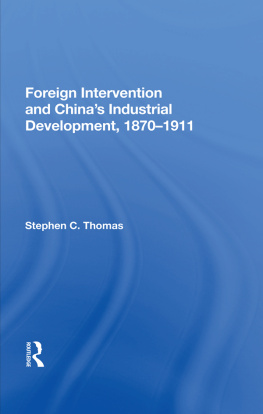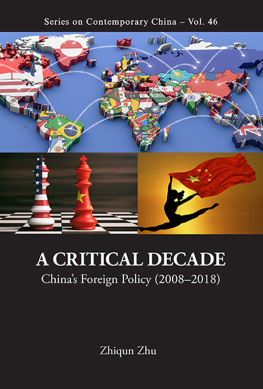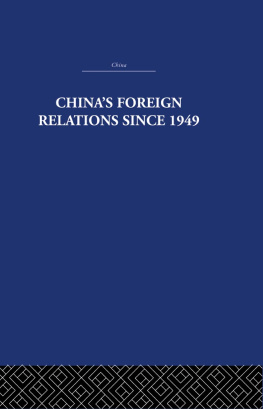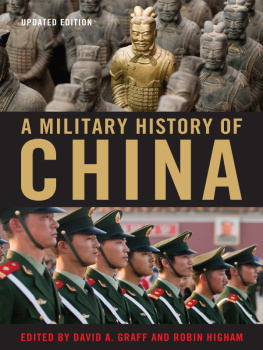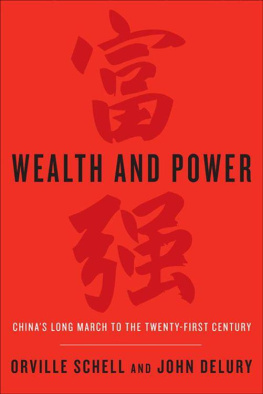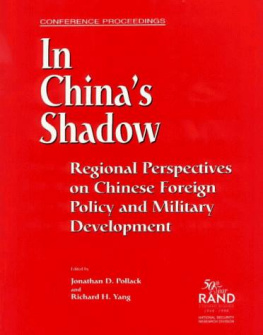Foreign Intervention and Chinas Industrial Development, 18701911
Westview Replica Editions
The concept of Westview Replica Editions is a response to the continuing crisis in academic and informational publishing. Library budgets for books have been severely curtailed. Ever larger portions of general library budgets are being diverted from the purchase of books and used for data banks, computers, micromedia, and other methods of information retrieval. Interlibrary loan structures further reduce the edition sizes required to satisfy the needs of the scholarly community. Economic pressures on the university presses and the few private scholarly publishing companies have severely limited the capacity of the industry to properly serve the academic and research communities. As a result, many manuscripts dealing with important subjects, often representing the highest level of scholarship, are no longer economically viable publishing projects-or, if accepted for publication, are typically subject to lead times ranging from one to three years.
Westview Replica Editions are our practical solution to the problem. We accept a manuscript in camera-ready form, typed according to our specifications, and move it immediately into the production process. As always, the selection criteria include the importance of the subject, the works contribution to scholarship, and its insight, originality of thought, and excellence of exposition. The responsibility for editing and proofreading lies with the author or sponsoring institution. We prepare chapter headings and display pages, file for copyright, and obtain Library of Congress Cataloging in Publication Data. A detailed manual contains simple instructions for preparing the final typescript, and our editorial staff is always available to answer questions.
The end result is a book printed on acid-free paper and bound in sturdy library-quality soft covers. We manufacture these books ourselves using equipment that does not require a lengthy make-ready process and that allows us to publish first editions of 300 to 600 copies and to reprint even smaller quantities as needed. Thus, we can produce Replica Editions quickly and can keep even very specialized books in print as long as there is a demand for them.
About the Book and Author
Foreign Intervention and Chinas Industrial Development, 18701911
Stephen C. Thomas
More than one hundred years ago, imperial Chinese leaders tried to industrialize their nation, much as Chinas leaders are attempting today. Self-strengthening projects in industry and the military were implemented to increase Chinas wealth and power and to protect the country from further colonization by the Western powers of the nineteenth century. Many recent studies argue that domestic factors such as corruption, nepotism, and Confucian traditions of government and society prevented the industrial enterprises initiated by China from 1870 to 1911 from achieving success.
Dr. Thomas takes a different view, showing that foreign intervention had more influence than purely domestic concerns on the nations industrialization efforts. He points to the year 1897 as a turning point in Chinas development. Prior to that date, costly levels of foreign intervention hampered, but did not prevent the successful development of modern enterprises in transportation, mining, and manufacturing. Afterward, however, greatly increased levels of intervention destroyed or hobbled previously successful endeavors and reduced the chances of success of many new ones. Comparison with similar industrialization efforts in Japan supports this thesis.
This book provides a historical perspective for understanding current Chinese industrialization policies, particularly the extreme care shown by leaders of the Peoples Republic of China to maintain as much control as possible over the introduction of foreign technology during the push for the Four Modernizations.
Stephen C. Thomas is assistant professor of political science at the University of Colorado at Denver.
First published 1984 by Westview Press
Published 2018 by Routledge
52 Vanderbilt Avenue, New York, NY 10017
2 Park Square, Milton Park, Abingdon, Oxon OX14 4RN
Routledge is an imprint of the Taylor & Francis Group, an informa business
Copyright 1984 by Taylor & Francis
All rights reserved. No part of this book may be reprinted or reproduced or utilised in any form or by any electronic, mechanical, or other means, now known or hereafter invented, including photocopying and recording, or in any information storage or retrieval system, without permission in writing from the publishers.
Notice:
Product or corporate names may be trademarks or registered trademarks, and are used only for identification and explanation without intent to infringe.
Library of Congress Cataloging-in-Publication Data
Thomas, Stephen C.
Foreign intervention and Chinas industrial development, 18701911.
(Replica series) (A Westview replica edition)
Bibliography: p.
Includes index.
1. China Commercial policy History. 2. China Foreign economic relations.
3. China Economic policy. I. Title. II. Series.
HF1604.T48 1984 338.951 82-20257
ISBN 0-86531-912-X (pbk.)
ISBN 13: 978-0-367-01974-7 (hbk)
I owe the inspiration for this study to Professor Frank Bonilla, who in his classes at Stanford University suggested the importance of non-Western perspectives on political and economic development. 1 began my study as a participant in Professor John W. Lewis Tientsin-Tanghan local-systems project. Professor Lewis generously allowed me to use his large collection of material on the Kaiping Coal Mines.
Professor Lewis patiently and ably guided me through the completion of the dissertation that is the basis of this work. Professors Robert North and Lyman Van Slyke served as critics and discussants of various approaches to the question of imperialism and Ching China. Professor Kurt Steiner helped strengthen the comparative perspective. The Hoover Institution of Stanford University kindly provided me access to the Hoover Archives and to the East Asian collection.
In revising and rewriting the dissertation for publication, I am indebted to my colleagues at the University of Colorado at Denver for reading drafts and offering helpful comments. Professor Michael Cummings made valuable editorial and methodological suggestions. Professor Joel Edelstein contributed important insights into questions of dependency and development. I also have greatly benefitted from comments, criticisms, and suggestions of Jess Bell, Paul Cohen, James Cole, Stephen McKinnon, Noel Miner, Michael Oksenberg, and Peter Van Ness, who have read part or all of the manuscript at various stages. Joseph Esherick read several earlier drafts and was particularly generous with his time and useful suggestions. All errors and omissions made despite the guidance of my readers are, of course, my own.
I am indebted to the Social Sciences division of the University of Colorado at Denver for financial and secretarial support during important points of the rewriting. I was ably and unstintingly assisted during the rewriting by Nancy Dawson, who helped also with the bibliography and the index.
Finally, I owe many thanks to my wife Carol for her loving support and to our sons Michael and Nicholas for their patience during the completion of this book.
Stephen C. Thomas

